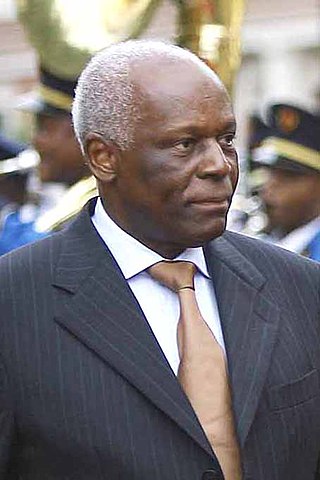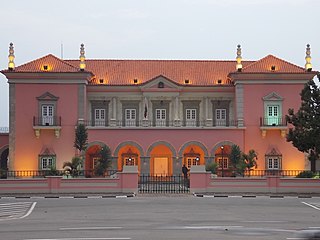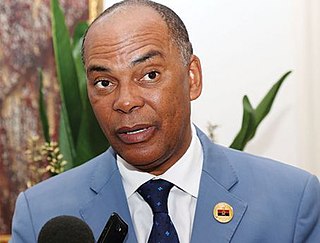Related Research Articles

Angola was first settled by San hunter-gatherer societies before the northern domains came under the rule of Bantu states such as Kongo and Ndongo. In the 15th century, Portuguese colonists began trading, and a settlement was established at Luanda during the 16th century. Portugal annexed territories in the region which were ruled as a colony from 1655, and Angola was incorporated as an overseas province of Portugal in 1951. After the Angolan War of Independence, which ended in 1974 with an army mutiny and leftist coup in Lisbon, Angola achieved independence in 1975 through the Alvor Agreement. After independence, Angola entered a long period of civil war that lasted until 2002.

The National Union for the Total Independence of Angola is the second-largest political party in Angola. Founded in 1966, UNITA fought alongside the People's Movement for the Liberation of Angola (MPLA) and the National Liberation Front of Angola (FNLA) in the Angolan War for Independence (1961–1975) and then against the MPLA in the ensuing civil war (1975–2002). The war was one of the most prominent Cold War proxy wars, with UNITA receiving military aid initially from the People's Republic of China from 1966 until October 1975 and later from the United States and apartheid South Africa while the MPLA received material and technical support from the Soviet Union and its allies, especially Cuba.

Jonas Malheiro Sidónio Sakaita Savimbi was an Angolan revolutionary, politician, and rebel military leader who founded and led the National Union for the Total Independence of Angola (UNITA). UNITA was one of several groups which waged a guerrilla war against Portuguese colonial rule from 1966 to 1974. Once independence was achieved, it then became an anti-communist group which confronted the ruling People's Movement for the Liberation of Angola (MPLA) during the Angolan Civil War. Savimbi had extensive contact with anti-communist activists in the United States, including Jack Abramoff and was one of the leading anti-communist voices in the world. Savimbi was killed in a clash with government troops in 2002.

José Eduardo Van-Dúnem dos Santos was an Angolan politician and military officer who served as the second president of Angola from 1979 to 2017. As president, dos Santos was also the commander-in-chief of the Angolan Armed Forces (FAA) and president of the People's Movement for the Liberation of Angola (MPLA), the party that has ruled Angola since it won independence in 1975. By the time he stepped down in 2017, he was the second-longest-serving president in Africa, surpassed only by Teodoro Obiang Nguema Mbasogo of Equatorial Guinea.

Huambo, formerly Nova Lisboa, is the third-most populous city in Angola, after the capital city Luanda and Lubango, with a population of 595,304 in the city and a population of 713,134 in the municipality of Huambo. The city is the capital of the province of Huambo and is located about 220 km E from Benguela and 600 km SE from Luanda. Huambo is a main hub on the Caminho de Ferro de Benguela (CFB), which runs from the port of Lobito to the Democratic Republic of the Congo's southernmost province, Katanga. Huambo is served by the Albano Machado Airport.

Elections in Angola take place within the framework of a multi-party democracy. The National Assembly is directly elected by voters, while the leader of the party or coalition with the most seats in the National Assembly automatically becomes President.

Isaías Henrique Ngola Samakuva is an Angolan politician who was the President of the National Union for the Total Independence of Angola (UNITA) from June 2003 to November 2019.

The Angolan Civil War was a civil war in Angola, beginning in 1975 and continuing, with interludes, until 2002. The war began immediately after Angola became independent from Portugal in November 1975. It was a power struggle between two former anti-colonial guerrilla movements, the communist People's Movement for the Liberation of Angola (MPLA) and the anti-communist National Union for the Total Independence of Angola (UNITA).

The Ovimbundu, also known as the Southern Mbundu, are a Bantu ethnic group who live on the Bié Plateau of central Angola and in the coastal strip west of these highlands. As the largest ethnic group in Angola, they make up 38 percent of the country's population. Overwhelmingly the Ovimbundu follow Christianity, mainly the Igreja Evangélica Congregacional de Angola (IECA), founded by American missionaries, and the Catholic Church. However, some still retain beliefs and practices from African traditional religions.
General António Sebastião Dembo served as Vice President (1992–2002) and later President (2002) of UNITA, an anti-Communist rebel group that fought against the MPLA in the Angolan Civil War.

Parliamentary elections were held in Angola on 5 and 6 September 2008, as announced by President José Eduardo dos Santos on 27 December 2007. They were the first since the 1992 general elections, which had led to the outbreak of the second phase of the Angolan Civil War, which continued until 2002.
The Lusaka Protocol, initialed in Lusaka, Zambia on 31 October 1994, attempted to end the Angolan Civil War by integrating and disarming UNITA and starting national reconciliation. Both sides signed a truce as part of the protocol on 15 November 1994, and the treaty was signed on 20 November 1994.
The 2000s in Angola saw the end of a 27-year-long civil war (1975–2002) and economic growth as foreign nations began to invest in Angola's untapped petroleum reserves. The government continues to resettle internally displaced persons as its economy recovers and expands.
Eduardo Jonatão Samuel "Dinho" Chingunji served as a political leader in UNITA, a pro-Western rebel group in Angola. During Angola's civil war (1975–2002), Eduardo was the only one of his brothers not to die in mysterious circumstances. Rumors attributed his brothers' deaths to assassination plots ordered by UNITA leader Jonas Savimbi.
In the 1990s in Angola, the last decade of the Angolan Civil War (1975–2002), the Angolan government transitioned from a nominally communist state to a nominally democratic one, a move made possible by political changes abroad and military victories at home. Namibia's declaration of independence, internationally recognized on April 1, eliminated the southwestern front of combat as South African forces withdrew to the east. The MPLA abolished the one-party system in June and rejected Marxist-Leninism at the MPLA's third Congress in December, formally changing the party's name from the MPLA-PT to the MPLA. The National Assembly passed law 12/91 in May 1991, coinciding with the withdrawal of the last Cuban troops, defining Angola as a "democratic state based on the rule of law" with a multi-party system.

The People's Republic of Angola was the self-declared socialist state which governed Angola from its independence in 1975 until 25 August 1992, during the Angolan Civil War. It was led by the People's Movement for the Liberation of Angola, which won the civil war and has since governed the country as a social democratic republic.
This article deals with the activities of the U.S. Central Intelligence Agency (CIA) in Angola. The list of activities may be incomplete due to the clandestine nature of the subject matter.

General elections were held in Angola on 31 August 2012 to elect the President and National Assembly. These were the first elections after the new 2010 constitution was instituted. During campaigning, the opposition UNITA and its offshoot CASA-CE accused and criticised the government of corruption and called for greater transparency; this led to protests and arrests the day before the election.

Adalberto Costa Júnior is an Angolan politician, current president of UNITA and a member of the National Assembly of Angola.
References
- ↑ Angola in Peace Archived 2007-09-27 at the Wayback Machine African Geopolitics quarterly magazine
- ↑ List of deputies elected in the 2008 election Archived 2008-09-19 at the Wayback Machine , CNE website (in Portuguese).